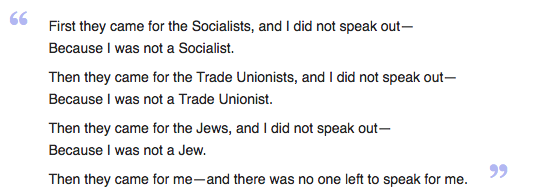This morning a few of us gathered for brunch, lured by pancakes and the promise of learning about security, by Aaron VonderHaar (@avh4). People shared experiences, as well as fears of what might happen in the future. EFF’s Danny O’Brien and others shared tips and perspectives on security and online safety.
A important thing to consider is that we need to take different precautions depending on what kinds of threats we expect. Generally Internet security has focused on malicious hackers and thieves. However, the threat model has changed. We also need to fear that our government might demand our information from 3rd parties which is less well protected than information that we hold personally. We need to be thoughtful of what companies we trust.
In addition to hackers and legal action, people who make political statements now have reason to fear false news stories as well as personal attacks that the Internet makes easier with doxxing and swatting.
Solidarity from social and community groups can help serve as protection, as well as developing a relationship (if possible) with local police and your representations. Undocumented residents and targeted groups have increased reason to fear our government, despite that our supreme court has historically upheld that US law extends even to those who are not citizens. Even if someone entered the country illegally, they still have the right to protection from discrimination and abuse. Even before this election, we have not not seen justice and police protection applied fairly and equally in the United States. Those of us with privilege have an opportunity and obligation to support those who ought to be protected by law.
Some useful links for more information:
* Feminist Frequency Online Safety Guide
* EFF Surveillance Self-Defense
* Signal Private Messaging by Whisper Systems, a mobile app with fully encrypted end-to-end communication.
* How to encrypt your entire life in less than an hour
